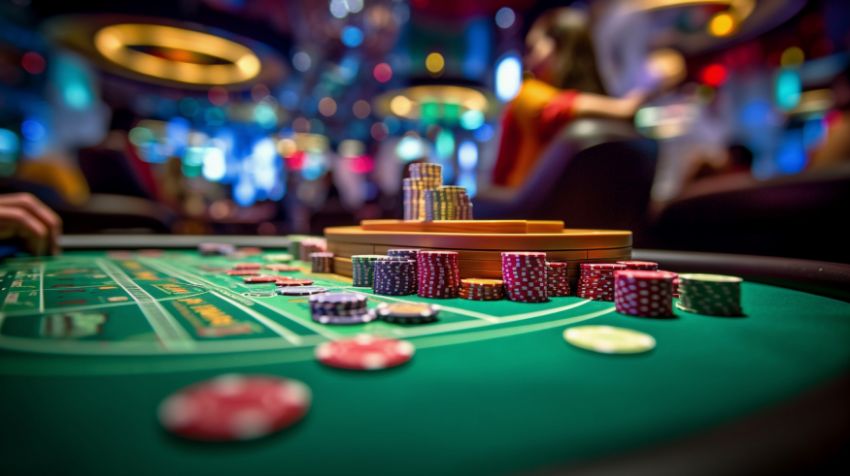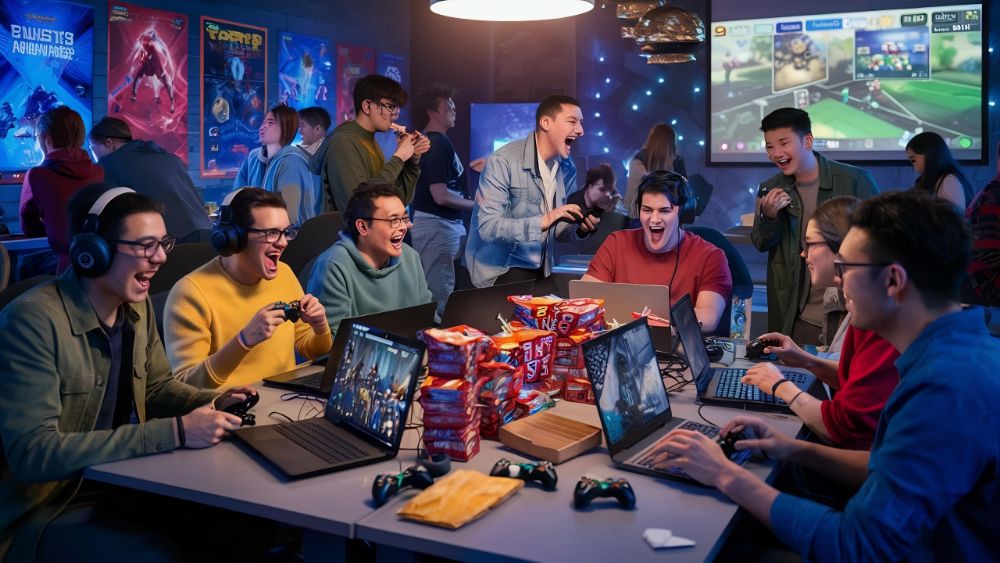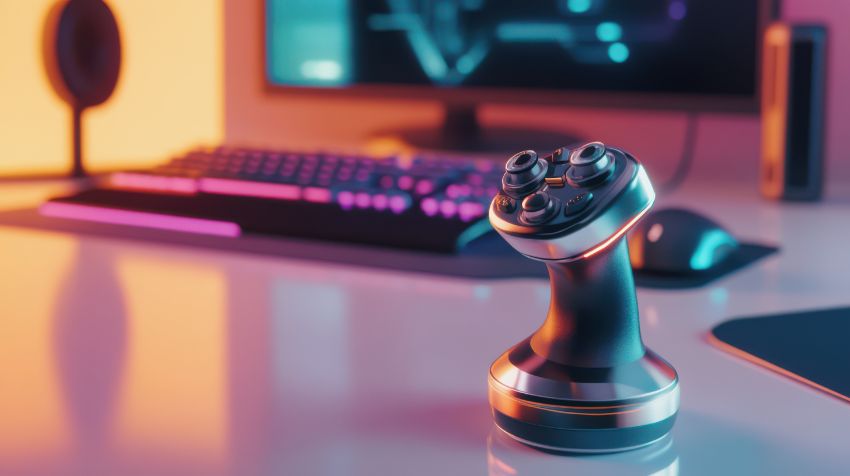Competitive gaming encompasses various psychological aspects that extend beyond mere entertainment. Players are driven not only by the aspiration to win but also by a sense of achievement and the appeal of structured rewards.
Mental resilience and emotional regulation prove crucial in navigating high-pressure situations, while social connections within gaming communities can further enhance performance.
The distinguishing factors for top players often include strategic thinking and cognitive flexibility. These elements collectively contribute to a player’s success, highlighting the complex interplay between psychological factors and competitive gaming performance.
Key Takeaways
- Players are motivated by the pursuit of mastery and personal challenge beyond mere enjoyment.
- Social connections and community involvement foster relationships and collective goals within the gaming environment.
- Achievements and rewards provide immediate and long-term incentives, enhancing player commitment and satisfaction.
- Mental resilience and emotional regulation are crucial for managing high-stakes challenges and maintaining performance.
- Strategic thinking, cognitive skills, and adaptability are essential for analyzing opponents and making quick decisions.
Motivation and Drive
Understanding the motivation and drive behind competitive gaming is crucial for comprehending what sustains players’ dedication and passion. One might question why individuals invest extensive hours refining their skills in a virtual environment. It extends beyond mere enjoyment; it involves a sense of mastery and the challenge of pushing personal limits.
Players often seek the challenge and the opportunity to test their abilities against others. The competitive landscape provides a platform to measure progress and strive for continuous improvement. The focus isn’t solely on winning but also on personal development and the satisfaction derived from overcoming challenges.
In the realm of competitive gaming, players frequently become part of communities that share similar interests and objectives. This social component can be a significant motivator. Relationships are built, teams are formed, and collective goals are pursued. The camaraderie and support within these communities can enhance performance and commitment.
Additionally, the dynamic nature of games maintains player engagement. With ongoing updates and evolving strategies, there’s always new content to learn and master. This continuous evolution ensures that players’ drive remains strong and their motivation sustained.
Achievement and Rewards
Achievements and rewards are crucial elements in maintaining engagement and motivation among competitive gamers. Reaching milestones or unlocking achievements delivers a sense of accomplishment that encourages continued participation. These rewards can range from in-game badges to exclusive items that differentiate players from others. Thus, players aren’t solely engaged for entertainment but also for achieving specific, tangible goals.
In the realm of competitive gaming, rewards can be both immediate and long-term. Immediate rewards, such as leveling up or acquiring a new weapon, provide instant feedback and satisfaction. Conversely, long-term rewards, like advancing on leaderboards or earning rare skins, necessitate sustained effort and skill. Both types of rewards contribute to ongoing player engagement.
Additionally, the structured nature of achievements allows players to set clear objectives. Players are aware of the criteria needed to reach the next level or unlock a particular reward. This clarity aids in maintaining focus and drive.
Successfully completing a difficult quest or attaining a high rank is particularly satisfying and reinforces the player’s commitment to the game. As such, achievements and rewards are integral to sustaining player interest and enhancing the gaming experience.
Social Connections
In competitive gaming, social connections significantly influence the overall gaming experience by affecting performance and engagement. Establishing connections with teammates fosters a sense of camaraderie and trust, which is crucial for coordinated gameplay. Effective communication, strategy development, and mutual support are facilitated through these connections.
Social connections also offer emotional benefits. Friendships formed in gaming can create a support network, providing encouragement during challenging matches and shared celebrations of victories. These relationships often extend beyond the game, forming a community where individuals feel valued and understood.
Additionally, social connections can accelerate the learning process. Engaging with others allows for the exchange of tips, strategies, and feedback, which can improve skills more quickly than playing alone. Observing different playstyles and discussing tactics provide new perspectives, promoting adaptability and innovation.
Participation in online forums, gaming clans, or gaming conventions can further strengthen these bonds. These platforms provide opportunities to meet like-minded individuals and expand one’s network.
Mental Resilience
In the realm of competitive gaming, mental resilience is an essential attribute. Players confront various challenges, ranging from high-stakes matches to unexpected losses, which test their ability to remain focused, manage stress, and maintain a positive mindset. Mental resilience isn’t solely about recovering from failures; it also involves sustaining peak performance under pressure.
Frustration and self-doubt are common in competitive gaming. A resilient mindset enables players to navigate these emotional obstacles effectively. Developing coping strategies, such as controlled breathing and positive self-talk, can help in managing emotions and maintaining focus. It’s crucial to learn from mistakes without allowing them to become defining moments.
Moreover, mental resilience aids in handling the physical demands of prolonged gaming sessions. Fatigue and burnout can negatively impact performance, but a strong mental framework can help mitigate these effects. Implementing self-care practices, such as ensuring adequate sleep and taking regular breaks, is important for maintaining mental stamina.
Strategic Thinking
Strategic thinking is crucial for success in competitive gaming, where each decision can significantly impact the outcome. It involves analyzing the opponent’s tactics and adapting swiftly to evolving scenarios. This skill requires anticipation, forward planning, and decision-making under pressure, grounded in a thorough understanding of game mechanics.
Initially, it’s essential to develop the ability to read the game. Observing patterns, predicting the opponent’s next moves, and staying several steps ahead are fundamental aspects. This approach is akin to playing chess, where proactive planning is more advantageous than mere reaction. Developing this foresight can provide a competitive edge.
Moreover, having a contingency plan is vital. Flexibility in strategy is a key component of competitive gaming. If the primary strategy proves ineffective, transitioning smoothly to an alternative plan is crucial. This adaptability can be decisive in reversing unfavorable situations.
Finally, reviewing gameplay is an important practice. Analyzing past matches helps in identifying errors and areas needing improvement. This process of self-reflection is essential for refining strategic thinking.
Emotional Regulation
Mastering strategic thinking equips players with the tools to outsmart opponents, but emotional regulation is also crucial for maintaining an edge during high-stakes moments. Emotions can fluctuate significantly during competition, ranging from excitement to frustration. Effectively managing these emotional changes is essential for maintaining focus and optimal performance.
Emotional regulation involves managing feelings rather than suppressing them. Techniques such as deep breathing, mindfulness, and positive self-talk can help individuals remain calm and composed. For instance, deep breathing can help reset one’s mindset when experiencing anger or disappointment after a setback.
Mindfulness promotes staying present, which can prevent dwelling on past mistakes or worrying about future outcomes.
Additionally, emotional regulation can improve decision-making processes. A calm state of mind is more conducive to making rational decisions, as opposed to impulsive choices driven by frustration or fear. Developing this skill requires practice but can enhance overall performance and resilience.
Cognitive Skills
Cognitive skills are essential for successful competitive gaming. The abilities to focus, think strategically, and make quick decisions directly affect a player’s performance. In high-stakes environments, rapid information processing and adaptability to changing scenarios are crucial. This involves honing skills such as memory, attention, and problem-solving.
During gameplay, the brain manages multiple tasks simultaneously. Players must recall previous strategies, anticipate opponents’ moves, and react quickly. Quick decision-making under pressure isn’t just beneficial but necessary.
Cognitive flexibility enables players to adjust strategies or tactics as the game progresses, providing an advantage over less adaptable competitors.
Pattern recognition also plays a significant role. Identifying patterns in opponents’ behavior or game mechanics can offer insights that help players outmaneuver their rivals. Spatial awareness aids in understanding the virtual environment, managing resources, and positioning advantageously.
Training these cognitive skills can be as important as physical training for traditional athletes. Mental exercises, such as puzzles and strategy games, can enhance cognitive abilities, making players more effective in competitive settings.
In competitive gaming, mental acuity is a critical asset.
Also, check out our article about How to Train for Competitive Gaming
Stress Management
Effective stress management is vital for competitive gamers to sustain optimal performance levels. Elevated stress triggers the release of cortisol, which can impair reaction time, decision-making, and general gameplay. Implementing stress management strategies is therefore crucial.
First, consider the benefits of breathing exercises. Engaging in deep, controlled breaths can lower heart rate and help regain composure. A recommended technique involves inhaling for four seconds, holding the breath for seven seconds, and exhaling for eight seconds. This practice can effectively reduce stress levels.
Second, establishing a pre-game routine can be beneficial. Consistent preparation rituals can foster a sense of normalcy and mitigate anxiety. Activities such as listening to music, stretching, or visualizing successful outcomes can be useful. Identifying and consistently following a routine that works for you is essential.
Third, taking regular breaks is important. Continuous gaming without adequate rest can increase stress and lead to burnout. A five-minute break every hour to stretch, hydrate, or relax can help maintain mental and physical well-being.
Lastly, maintaining a healthy lifestyle is crucial for stress management. Regular physical exercise, balanced nutrition, and sufficient sleep are foundational components. A healthy body supports a more resilient mind, enabling better management of the demands of competitive gaming.
Performance Consistency
Achieving performance consistency is a critical objective for competitive gamers. While moments of exceptional performance are valuable, sustaining a consistent level of play is essential for maintaining ranks and winning matches. This requires a balanced approach that incorporates both mental and physical preparation.
Establishing a routine with regular practice sessions is fundamental. Consistent practice enables players to internalize game mechanics and strategies, allowing for more automatic and reliable execution during high-pressure situations.
Mental preparation is equally important. Maintaining focus and a positive outlook, even in challenging circumstances, can significantly impact performance. Visualization techniques can be useful for mentally rehearsing successful gameplay, thereby enhancing confidence.
Additionally, a healthy lifestyle—adequate sleep, a balanced diet, and regular exercise—can contribute significantly to overall performance.
Adaptability is another crucial factor. Competitive games frequently undergo updates and patches that can alter the meta. Being flexible and willing to adjust strategies accordingly is essential. Regularly reviewing gameplay can help identify and correct mistakes, fostering continuous improvement.
Furthermore, effective teamwork and communication are vital. Coordination with teammates can greatly influence the consistency of performance. By focusing on these elements, players can improve their ability to deliver reliable performances consistently.
Conclusion
In competitive gaming, your motivation fuels your drive, while achievements and rewards keep you engaged. Social connections bolster your experience, enhancing your mental resilience. Strategic thinking and emotional regulation are essential for staying ahead, and your cognitive skills help you adapt to ever-changing game dynamics. By managing stress and maintaining performance consistency, you elevate your gameplay. Ultimately, the blend of these psychological elements shapes your journey and success in the world of competitive gaming.



